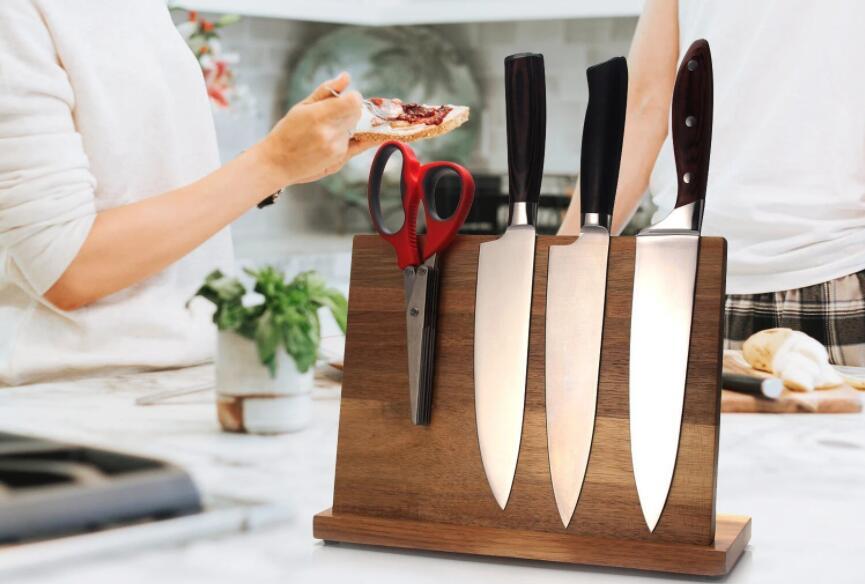As we all know, quality kitchen knives are essential for home chefs or pro chefs. But caring for them isn’t as straightforward or intuitive as you might think. One of my chef's friends said" your kitchen knives should be treated completely different and should be separate for other kitchen gadgets." Today, we are going to introduce a list of methods to help you extend the lifetime of your kitchen knives.

After long-time use, every blade will become dull. how long will it last depend on the quality of steel, usage, and maintenance of the blade. So we have to know the correct usage and maintenance of the kitchen knife in order to extend its lifespan and enjoy a sharp blade all the time.
We’ll try to answer following questions to make you clear how to extend the lifetime of your kitchen knives:
Factors that affect how long keep the edge
How to reserve your edge?
How often do i need to sharpen my knives?
How to store your knife?
How to take care of high-quality kitchen knives?
Ok, let’s explore the answer of these questions.
Factors that affect how long keep the edge
1. Hardness of steel
The better the steel is, the longer a blade will hold a sharp edge.
2. Usage of a knife
Proper maintenance, regular maintenance, proper storage, and correct usage will extend the longevity of your knives. comes to properly maintain your knives, we talk about in other parts of this article. remember to invest in a knife sharpener so that you can always ensure your knives are in their good condition.
Moreover, mastering good cutting techniques will also help.
3. Surface of our cutting board
Don't cut on a marble countertop, glass plate, ceramic baking tray, steel tray and other similar surfaces which were harder than knives for cutting. We recommend investing wood or polyethylene or synthetic cutting boards. the most knife-friendly cutting board is Walnut, Bamboo, Teak, and plastics cutting boards. there are research shows that wooden cutting boards are perfectly safe to use because they are bacteria resistant.
In addition, to have a healthy kitchen, you'd better selecting at least two cutting boards - one for raw meat and fish, and the other for vegetables and fruit.
How to reserve your knife edge?
1. Don’t cut frozen food or ice.
2. Don’t cut bones directly.
3. Don’t use any knife like a meat cleaver.
4. Don’t cut the edge to non-foods things
Never scrape food off your board with your knife-edge, use the knife spine instead to avoid dulling your edge. Remember, the less contact your edge has, the longer it will remain sharp – especially contact with non-foods.
5. Regular sharpening
Compared with a dull kitchen knife, a sharp knife is safer. The sharper the knife, the less risk to get cut. What's more, a sharp knife will not damage the cells of ingredients, thus the food will stay fresh longer and taste well when cooking. That's why it's important to regularly sharpen the knife to keep its sharpness.
regular sharpening is easier and faster and requires less material removal. It will prevent excessive blade wear over time. With appropriate maintenance, Japanese kitchen knives will last a lifetime.
Of course, knife sharpening skill is not easy to master. You have to learn how to sharpen a knife first. Once you got it, it shouldn't take more than 10-15 minutes to sharpen a knife. For more details, refer to our article: How to sharpen a knives.
How often do I need to sharpen my knives?
Everyone knows this simple principle: the more frequently you use your knife, the more often it needs to be sharpened. Think it simple, whenever you feel your knives are not cutting as well as you would want them to. As we mentioned above, there are kinds factors influence the sharpness of a knife. Here we show a generally guidelines:
For home chefs, once a month.
For professional chef, once a week.

How to store your knife?
The method in which chefs decide to store their kitchen knives can greatly influence the length of time that they remain sharp.
1. Using a magnetic metal strip
To make your knives stay in good condition, consider attaching them to a long enough magnetic metal strip to avoid rubbing against each other. This is a good choice of preserving the life of premium knives and to make sure that they do not be damaged by other utensils.by the way, this method is space-saving too.
2. Using a wooden block
Use a wood knife block to store knives is a commonly used option by many chefs as it is both visual elegance and functionally.
Of course, there a risk of producing bacteria from the storage slots. so, to avoid this problem, please remember completely dry the knife before inserting it into the wooden block.
3. Using a knife bag
Using a knife bag to store knife is also a frequent storage method. you can place the knife bag at a convenient, accessible location but keeps far away from children’s reach. Thus make knives separate from other kitchen tools to avoid being damaged and dull by other stored utensils.
4. Using a stainless knife block
Stainless steel features a functional and compact design to save space and store varieties of knives. Parallel slots separate the knife edges so that the knives won't touch each other. No potential risk of damaging the knife edges in the block.
Moreover, there is a drainage hole at the bottom of the stainless block which helps draining water after you have just washed your knives. Be remember to wipe down the stainless steel surface or rubberized lining to keep your knife block clean, healthy, and rust free.

How to take care of high-quality kitchen knives?
1. Always let your knife stay in dry and clean
Wipe your knife with a clean and dry cloth regularly after you finish using it.
2. Hand wash with warm soapy water
After rinse it with lukewarm water, dry it and apply food safe neutral oil on it. ordinary refined or edible )oil like sunflower, camellia oil can work. The oil will act as a barrier to help protect against future exposure to moisture and acids.
3. Put the knife in paper towels to absorb moisture and protects the knife.
4. Never put your knife in the dishwasher
Place your kitchen knives into the dishwasher is never a good idea.
Firstly, because the dishwasher detergents are so powerful that they can easily pit the steel of knives.
Secondly, the turbulence in dishwashers can lead knives to nick and dull in their collision with other dishes.
Even though the knife manufacturer claims that it is dish-washer and will not harm the product, we recommend hand-washing.
5. Never soak knives in water
First, if you forget you put it into the water, it increases risk of cutting yourself.
Second, soak it in water too long will result rust or corrosion.

Conclusion
After you got a new knife or knife set, make sure you are using the correct knife for your cooking purposes, make sure you use right cutting techniques make sure you clean, store, and sharpen it correctly, make sure you maintain it appropriately.
Take good care of your kitchen knives to extend the longevity of it, they will reward you a better kitchen life.


0 comments